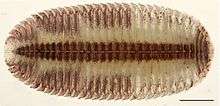Siphonocryptida
Siphonocryptida is an order of millipedes, comprising the sole family Siphonocryptidae. With only seven described species, the Siphonocryptida is the second smallest millipede order, surpassed only by Siphoniulida, with two species.[1]
| Siphonocryptida | |
|---|---|
 | |
| Siphonocryptus zigzag | |
| Scientific classification | |
| Kingdom: | |
| Phylum: | |
| Subphylum: | |
| Class: | |
| Subclass: | |
| Infraclass: | |
| Order: | Siphonocryptida Cook, 1895 |
| Family: | Siphonocryptidae Pocock, 1894 |
| Genera | |
|
Hirudicryptus | |
| Synonyms | |
|
Siphonocryptini | |
Classification
- Hirudicryptus Enghoff & Golovatch, 1995
- Hirudicryptus canariensis (Loksa, 1967) - Canary Islands
- Hirudicryptus taiwanensis Korsós et al., 2008 - Taiwan
- Hirudicryptus quintumelementum Korsós et al., 2009 - Tibet
- Hirudicryptus abchasicus Golovatch, Evsyukov & Reip, 2015 - NW Caucasus
- Siphonocryptus Pocock, 1894
- Siphonocryptus compactus Pocock, 1894 - Sumatra
- Siphonocryptus latior Enghoff & Golovatch, 1995 - Peninsular Malaysia
- Siphonocryptus zigzag Enghoff, 2010 - Pahang
gollark: I too want to ship a large and probably slow Lua VM with my application.
gollark: At this point I'm actually very tempted to just use BBCode or something.
gollark: Unfortunately it has a weird bug with emphasis/bold and punctuation in some places, so I had to look at this.
gollark: I'm using an existing Markdown parsing library and using its vaguely tokenized output to produce virtual DOM.
gollark: This is an actual regex used to parse Markdown by one project:```^(?:(\*(?=[`\]!"#$%&'()+\-./:;<=>?@\[^_{|}~]))|\*)(?![\*\s])((?:(?:(?!\[.*?\]|`.*?`|<.*?>)(?:[^\*]|[\\s]\*)|\[.*?\]|`.*?`|<.*?>)|(?:(?:(?!\[.*?\]|`.*?`|<.*?>)(?:[^\*]|[\\s]\*)|\[.*?\]|`.*?`|<.*?>)*?(?<!\)\*){2})*?)(?:(?<![`\s\]!"#$%&'()+\-./:;<=>?@\[^_{|}~])\*(?!\*)|(?<=[`\]!"#$%&'()+\-./:;<=>?@\[^_{|}~])\*(?!\*)(?:(?=[`\s\]!"#$%&'()+\-./:;<=>?@\[^_{|}~]|$)))|^_([^\s_])_(?!_)|^_([^\s_<][\s\S]*?[^\s_])_(?!_|[^\s,!"#$%&'()+\-./:;<=>?@\[^_{|}~])|^_([^\s_<][\s\S]*?[^\s])_(?!_|[^\s,!"#$%&'()+\-./:;<=>?@\[^_{|}~])```(it's generated from a slightly less insane one with`punctuation` in place of the big mess of punctuation characters, to be fair)
References
- Enghoff, H (2010). "A new strikingly coloured species of Siphonocryptus, sixth of its order (Diplopoda: Siphonocryptida)" (PDF). Zootaxa. 2681: 66–68.
This article is issued from Wikipedia. The text is licensed under Creative Commons - Attribution - Sharealike. Additional terms may apply for the media files.